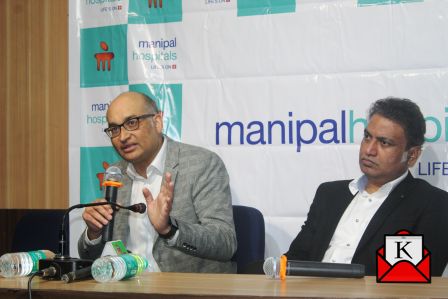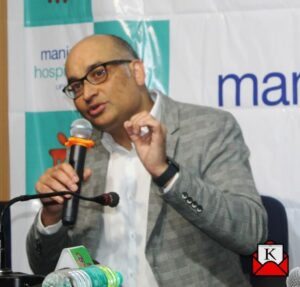Bone Marrow Transplant Helps In Treating Multiple Myeloma


A blood cancer that develops from plasma cells, multiple myeloma makes for 10% to 15% of all blood cancers. Currently, there are roughly 1 in 100,000 incidences of this type of cancer in India, but recent figures suggest that there may be a rise in cases in major cities. The month of March is recognized as Multiple Myeloma Awareness Month. In light of this, Manipal Hospital held a press conference in an effort to raise the general public’s knowledge of the illness.
Dr. Mallikarjun Kalashetty, Consultant – Haematology, Haemato Oncology & Bone Marrow Transplantation, and Dr. Ashish Dixit, Consultant – Haematology, Haemato Oncology & Bone Marrow Transplantation, Manipal Hospital Old Airport Road stressed on the importance of detecting and treating multiple myeloma early to achieve a better prognosis and a good quality of life.
Multiple myeloma affects people more frequently when they are younger than in the west, and as a result, patients are more likely to have a larger disease load upon diagnosis as well as more cases of severe bone disease, renal failure, and spinal cord compression linked to the disease. Multiple Myeloma patients experience a range of symptoms, including bone and back pain, weakness, exhaustion, infections, and renal failure. Due to these various clinical symptoms, patients may wind up seeing numerous specialists, which delays the diagnosis of multiple myeloma.
The oldest transplantation facility in Karnataka and one of the first in South India is the “Bone Marrow Transplant Center” at Manipal Hospital Old Airport Road, Bangalore. It provides the best care possible for patients with cancer and blood problems, under the direction of knowledgeable hemato-oncologists and cutting-edge technologies. Its cutting-edge hospital treats both benign and malignant disorders of every sort. Under one roof, bone marrow transplants that are both autologous and allogenic—including those involving matched siblings, matched strangers, partially matched donors, or haploidentical donors—are carried out. Every month, the hospital’s hematology division handles roughly 50 new cases from the eastern region of India, particularly West Bengal.
Throughout the past few decades, multiple myeloma treatment has advanced significantly. This is a result of a better understanding of the biology of myeloma, which has led to improvements in diagnosis and treatment that may extend survival times with a very high quality of life. With a mix of targeted therapy and stem cell transplant, doctors treat certain forms of cancer. Patients with multiple myeloma may get targeted therapy, such as proteasome inhibitors. With the addition of immunotherapy, targeted treatments, and monoclonal antibodies, myeloma treatment has significantly advanced, making long-term survival with a good quality of life conceivable.
Despite the fact that there are several therapies available, diagnosing this ailment might be difficult. Patients have a range of cancer consequences as a result of inadequate access to healthcare resources, a lack of knowledge about the illness, and a delay in diagnosis and treatment. One of the standard consolidation therapies for myeloma is a bone marrow transplant. Yet, the vast majority of patients are unable to access it due to a lack of knowledge and availability. There is a need to address this issue with improved education and awareness among the public regarding multiple myeloma.
Priyanka Dutta
